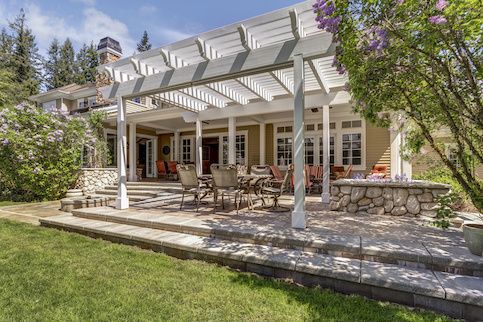If you’re in the market to buy a house, you might be considering a condo. Condos, or condominiums, are popular alternatives to single-family homes and typically come with a range of amenities, including, in many cases, a communal gym and private parking.
Financing a condo, though, can involve a different process than other home purchases. A condo mortgage loan may come with a slightly higher interest rate than a typical home mortgage and carry additional requirements.
Let’s take a closer look at condos and condo loans, including how to qualify for a condo mortgage. That way, if you’re interested in purchasing a condo, you’ll feel prepared to embark on the journey.
What Is A Condo?
Condos are individual units in a residential building that share walls and amenities, such as outdoor space, pools and gyms. Condos are often more affordable and require less maintenance than traditional single-family homes, making them a popular option with buyers.
One key feature distinguishing condo purchases from some home purchases is having to pay fees to a condo association or homeowners association (HOA), although many owners of non-condo homes are required to pay HOA fees, too. This money covers the cost of maintaining the outdoor spaces and common areas within the condo complex.
Condo owners are still responsible for the maintenance and repairs that are necessary for their individual unit, however. Residents are also expected to follow the HOA’s rules for condo living, such as abiding by noise level restrictions and adhering to pet regulations.
See What You Qualify For
Buy A Home
Discover mortgage options that fit your unique financial needs.

Refinance
Refinance your mortgage to have more money for what matters.
Tap Into Equity
Use your home’s equity and unlock cash to achieve your goals.
What Is A Condo Mortgage?
Just like with any home purchase, you have to decide how to finance the purchase of a condo. Condo loans are mortgages that help buyers purchase a condominium, regardless of whether you’ll use it as a primary residence, vacation home or investment property.
While the mortgage process for a condo is like the process associated with getting most mortgages, condo loans may have different or additional regulations established by the mortgage lender. They can be riskier for mortgage lenders because of external factors, such as HOA rules and restrictions that are outside of the borrower’s control.
How Are Condo Loans Different From Other Mortgages?
The process of securing a condo loan isn’t so different from getting the financing to purchase a different type of home. You can often apply for a conventional loan or FHA loan, along with other mortgage options, just as you’d apply for a traditional single- or multifamily home loan. However, a few key differences are worth considering before you set out to purchase a condominium.
First, as noted earlier, a condo mortgage loan may come with a marginally higher interest rate because a lender views it as higher risk than a mortgage for a stand-alone home. The condo loan underwriting and approval process may also take more time because extra documentation is necessary to satisfy condo project and HOA requirements. This is in addition to the paperwork you’ll need to validate your personal finances.
How Does Condo Financing Work?
Because condos are individually owned units in a wider community building, lenders look at them a little differently than single-family homes. More occupants in a condominium complex mean more people could default on their mortgage. Plus, situations outside of the borrower’s control – such as a broken elevator or leaky roof – could require special assessments and cost the borrower more money as a result.
Therefore, one factor that lenders consider when evaluating applicants for a condo loan is the condominium property itself, which can include the building’s occupancy, structural integrity, amenities and financial health. Lenders may also want to see that the condo’s proof of insurance, HOA budgets and HOA reserves are up to their standards.
Take the first step to buy a home.
Quicken Loans® lets you get to house hunting sooner.
Do Condos Require Special Loan Programs?
Borrowers can apply for condo financing through the same loan programs they might use to finance any other type of property. However, some distinctions are worth keeping in mind. Depending on the type of loan you’re interested in, a lender may have specific borrower and condominium requirements you must meet before they’ll approve you for a mortgage.
For example, the Federal Housing Administration (FHA) and the U.S. Department of Housing and Urban Development (HUD) have a condo-approved list for FHA loans. If a condo doesn’t appear on the list, the borrower will need to seek a different loan type, such as a conventional mortgage. But even a conventional loan might not be satisfactory for the financing of some condos, as we’ll learn about in greater detail in just a moment.
Warrantable Vs. Non-Warrantable Condos
Next up is a breakdown of warrantable and non-warrantable condos, focused on how you’ll have to find out whether the condo is warrantable or non-warrantable if you’re planning to take out a conventional conforming mortgage – one that’s funded by a private lender, rather than the federal government, and conforms to the guidelines of government-sponsored enterprises (GSEs) Fannie Mae and Freddie Mac and the Federal Housing Finance Agency (FHFA), which is responsible for regulating the two GSEs.
Warrantable Condo
A warrantable condo can be financed by a home buyer using a conforming loan. To qualify as a warrantable condo, the condominium must meet the requirements established by Fannie and Freddie. These guidelines include, but aren’t limited to, the following:
- No single entity can own more than two units in a condo building (or project) with five to 20 units, or more than 20% of units in a building with 21 or more units.
- For investment properties, at least 50% of the total units are owner-occupied (or are primary residences or second homes).
- At least 10% of the budget provides funding for reserves, which can go toward building maintenance, repairs, etc.
- Commercial spaces may not exceed 35% of the condo building’s square footage.
Non-Warrantable Condo
Non-warrantable condos are condos that don’t meet the lending guidelines of Fannie Mae and Freddie Mac. This can make financing a non-warrantable condo more difficult, and you may have to seek assistance outside of conventional mortgages and other standard lending options.
A condo is considered non-warrantable if any of the following statements are true:
- The HOA or condo association is named in a lawsuit.
- The condo building includes manufactured homes.
- The building operates as a hotel, motel or timeshare.
- More than 15% of the total condo units are 60 days or more delinquent, or behind, on their HOA fees.
Condo Loan Types And Requirements
The type of mortgage you can and should use to finance a condo will depend largely on how you wish to use the property (as a primary residence or investment property), your financial situation and whether the condo meets specific lender requirements.
Let’s explore some of the loans that people commonly use to finance a condo purchase.
Conventional Loans
Backed by private lenders – banks, credit unions and other financial institutions – rather than an agency of the federal government, conventional mortgages can come with a down payment requirement as low as 3% of the purchase price, but you’ll need to put 20% or more down if you want to avoid private mortgage insurance (PMI).
For most conventional loans, you’ll need a credit score of at least 620 and a debt-to-income ratio (DTI) of no more than 50% at the very highest.
VA Loans
Insured by the Department of Veterans Affairs, or VA, VA home loans are available to eligible veterans, eligible active-duty service members, qualifying spouses, and members of the National Guard and U.S. Army Reserve who meet the criteria for eligibility. These loans don’t require a down payment, but your individual lender is likely to have credit score and DTI requirements of its own.
You’ll also face a one-time VA funding fee from the VA.
FHA Loans
Backed by the FHA and HUD, FHA loans are available to many low- and moderate-income borrowers. These mortgages usually allow for a lower minimum credit score than conventional loans. In some cases, borrowers may also be able to put less money down.
The condo you want to purchase will also have to appear on the FHA-approved condo list.
USDA Loans
The U.S. Department of Agriculture offers USDA loans to eligible U.S. citizens and legal permanent residents in rural areas. Condo loan requirements depend on several factors, including your geographic location, income, DTI and credit score.
Tips For Buying A Condominium
Now that you have an idea of what to expect when taking out a condo loan, keep these other considerations in mind when moving forward in the condo buying process:
- Hire a real estate professional. It might be helpful to hire a real estate agent who specializes in condo purchases. They can help guide you through HOA regulations and any documentation specific to living in a particular condo building.
- Research condo properties. Investigating condos and management companies can be beneficial to you. Consider meeting with members of the condo association or current residents to gain insights on life as a resident of the complex.
- Assess the amenities. Condo amenities are nice, but they can make living in a specific complex more expensive. Evaluate whether features such as a pool, gym or clubhouse are worth it to you.
- Prepare for closing costs. You might have to pay more for mortgage insurance and a home appraisal than you would with a more run-of-the-mill home purchase. You might also have to cover the costs of documentation such as a condo questionnaire and other financial statements that the condo’s managing agent may require.
The Bottom Line
A condominium can be worth it for the right home buyer, especially if they’re looking for a low-maintenance property with convenient amenities. Applying and being approved for a condo loan, however, can be a more tedious process than financing a property such as a single-family home. For this reason, prospective buyers should make sure they’re prepared for the process.
Are you interested in buying a condo?
Find A Mortgage Today and Lock In Your Rate!
Get matched with a lender that will work for your financial situation.

Victoria Araj
Victoria Araj is a Staff Writer for Rocket Companies who has held roles in mortgage banking, public relations and more in her 15-plus years of experience. She has a bachelor’s degree in journalism with an emphasis in political science from Michigan State University, and a master’s degree in public administration from the University of Michigan.












